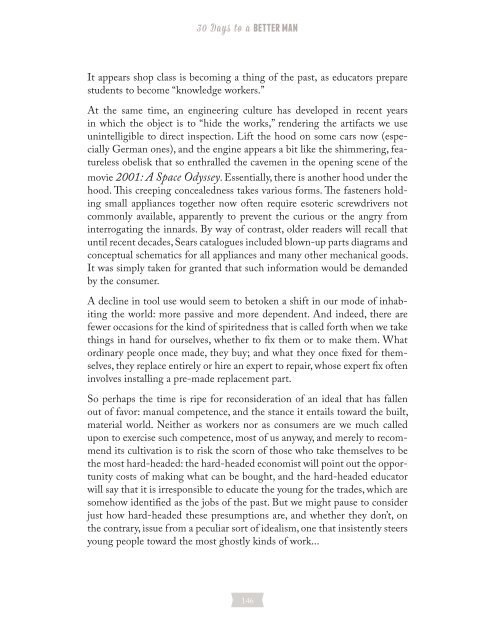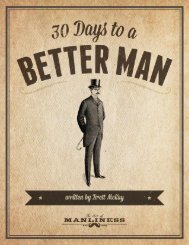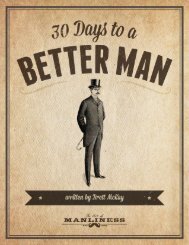588b1c58c8a68278cfc28555
You also want an ePaper? Increase the reach of your titles
YUMPU automatically turns print PDFs into web optimized ePapers that Google loves.
30 Days to a better man<br />
It appears shop class is becoming a thing of the past, as educators prepare<br />
students to become “knowledge workers.”<br />
At the same time, an engineering culture has developed in recent years<br />
in which the object is to “hide the works,” rendering the artifacts we use<br />
unintelligible to direct inspection. Lift the hood on some cars now (especially<br />
German ones), and the engine appears a bit like the shimmering, featureless<br />
obelisk that so enthralled the cavemen in the opening scene of the<br />
movie 2001: A Space Odyssey. Essentially, there is another hood under the<br />
hood. This creeping concealedness takes various forms. The fasteners holding<br />
small appliances together now often require esoteric screwdrivers not<br />
commonly available, apparently to prevent the curious or the angry from<br />
interrogating the innards. By way of contrast, older readers will recall that<br />
until recent decades, Sears catalogues included blown-up parts diagrams and<br />
conceptual schematics for all appliances and many other mechanical goods.<br />
It was simply taken for granted that such information would be demanded<br />
by the consumer.<br />
A decline in tool use would seem to betoken a shift in our mode of inhabiting<br />
the world: more passive and more dependent. And indeed, there are<br />
fewer occasions for the kind of spiritedness that is called forth when we take<br />
things in hand for ourselves, whether to fix them or to make them. What<br />
ordinary people once made, they buy; and what they once fixed for themselves,<br />
they replace entirely or hire an expert to repair, whose expert fix often<br />
involves installing a pre-made replacement part.<br />
So perhaps the time is ripe for reconsideration of an ideal that has fallen<br />
out of favor: manual competence, and the stance it entails toward the built,<br />
material world. Neither as workers nor as consumers are we much called<br />
upon to exercise such competence, most of us anyway, and merely to recommend<br />
its cultivation is to risk the scorn of those who take themselves to be<br />
the most hard-headed: the hard-headed economist will point out the opportunity<br />
costs of making what can be bought, and the hard-headed educator<br />
will say that it is irresponsible to educate the young for the trades, which are<br />
somehow identified as the jobs of the past. But we might pause to consider<br />
just how hard-headed these presumptions are, and whether they don’t, on<br />
the contrary, issue from a peculiar sort of idealism, one that insistently steers<br />
young people toward the most ghostly kinds of work...<br />
146


















